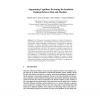Free Online Productivity Tools
i2Speak
i2Symbol
i2OCR
iTex2Img
iWeb2Print
iWeb2Shot
i2Type
iPdf2Split
iPdf2Merge
i2Bopomofo
i2Arabic
i2Style
i2Image
i2PDF
iLatex2Rtf
Sci2ools
110
click to vote
HCI
2007
2007
Augmenting Cognition: Reviewing the Symbiotic Relation Between Man and Machine
Abstract. One of the goals of augmented cognition is creation of adaptive human-machine collaboration that continually optimizes performance of the human-machine system. Augmented Cognition aims to compensate for temporal limitations in human information processing, for instance in the case of overload, cognitive lockup, and underload. Adaptive behavior, however, may also have undesirable side effects. The dynamics of adaptive support may be unpredictable and may lead to human factors problems such as mode errors, ‘out-of-the-loop’ problems, and trust related issues. One of the most critical challenges in developing adaptive human-machine collaboration concerns system mitigations. A combination of performance, effort and task information should be taken into account for mitigation strategies. This paper concludes with the presentation of an iterative cognitive engineering framework, which addresses the adaptation strategy of the human and machine in an appropriate manner carefully ...
Adaptive Human-machine Collaboration | Augmented Cognition | HCI 2007 | Human Computer Interaction | Human-machine Collaboration Concerns |
| Added | 29 Oct 2010 |
| Updated | 29 Oct 2010 |
| Type | Conference |
| Year | 2007 |
| Where | HCI |
| Authors | Tjerk de Greef, Kees van Dongen, Marc Grootjen, Jasper Lindenberg |
Comments (0)

